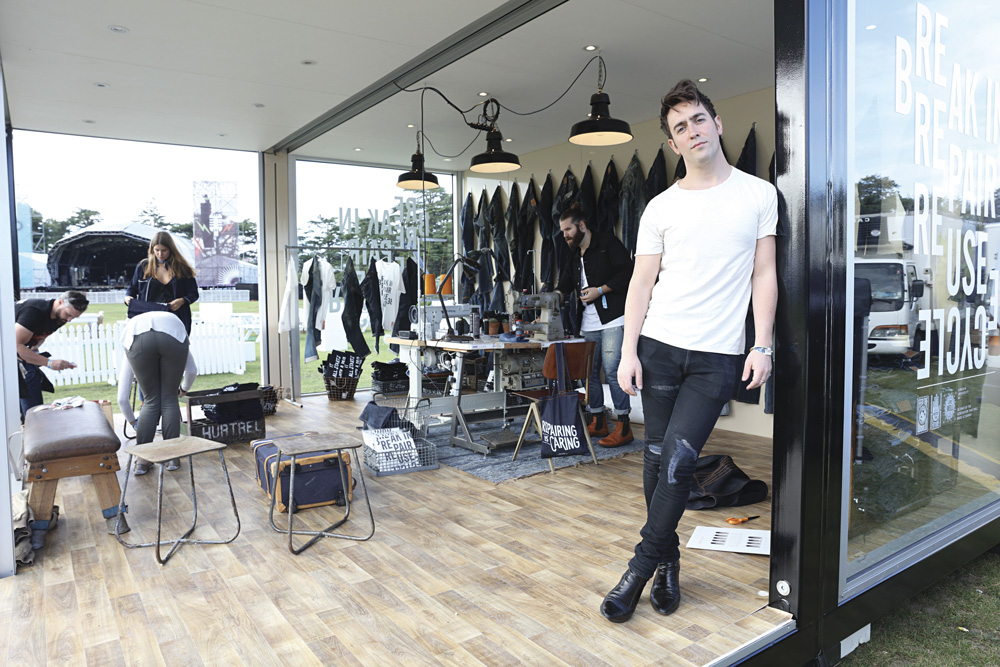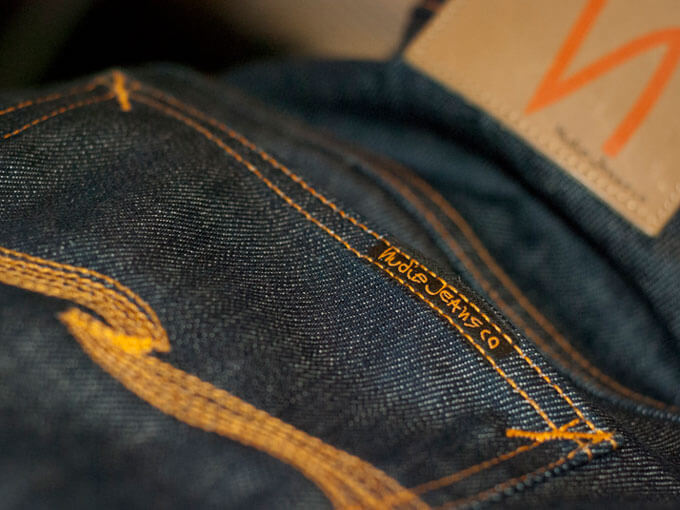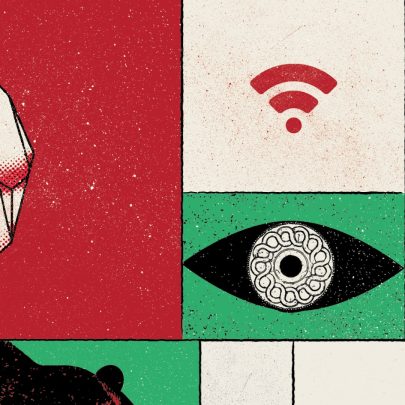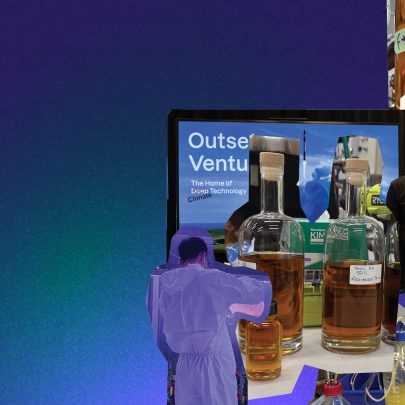Jun 13, 2016 Business
Swedish denim brand Nudie Jeans has some lessons for New Zealand business.
This article was first published in the June 2016 issue of Metro. It is brought to you in partnership with Lincoln University.
Read more: Truth and trust: How a Swedish denim brand is changing the way the world looks at jeans
Loyal wearers of Nudie jeans would have been delighted at the Auckland City Limits festival a couple of months back: they could drop by and have their jeans repaired in a converted shipping container for free. There was loud music and a view of the stage and rather a lot of denim, as you’d expect. There was a steady stream of people needing their jeans repaired, including a woman who was actually wearing her Nudies to the gig, but who wanted them fixed regardless: the team loaned her a pair to wear while her jeans were being fixed.
The sad thing about most denim is that just as your jeans start to wear in, they start to wear out. With a pair of Nudie jeans, it’s only the beginning: since 2012, the company has been rolling out repair stations across its stores around the world. Customers bring their jeans back in and get them repaired; if they’re just too far gone – or if their owner just doesn’t want them back – Nudie Jeans offer a 20 per cent discount on a new pair and either repairs them for resale, or recycles them into other products.
“It’s almost like a guarantee,” says Ruari Mahon, Nudie’s global head of public relations and communications. Mahon was wearing a skinny black pair of Nudies he’d owned for nearly six years: washed twice and repaired once, with blue and purple darning where they’d torn across the thigh.
On the face of it, it’s counter-intuitive. Most fashion – especially high-street fashion – is about selling new things, not fixing old ones.
On the face of it, it’s counter-intuitive. Most fashion – especially high-street fashion – is about selling new things, not fixing old ones. “Yeah,” says Mahon with his Irish lilt. “And no. We’ve only seen sales increase – through wholesale, e-commerce and repair shops as we have increased the amount of stores and service.”

Possibly, that’s because the programme doesn’t feel like a marketing gimmick. “Our founders came from other denim brands that were very corporate,” says Mahon. “And when they got together they wanted to create something that they truly believed in.” To that end, Nudie Jeans has always made their jeans from organic cotton, which uses less water and fewer chemicals, since conventional cotton is one of the most environmentally damaging things to produce. As the brand has evolved and grown, it has sought to produce its products – wherever they’re made in the world – in an ethical way. The first lines were produced in Europe, often in Italy, but the rate of growth with the brand since 2012 has led to the company opening up production in the likes of India and Tunisia – where the same high standards of production apply.
More recently, the brand has sought to make those supply chains completely transparent. Now, you can log onto the website and see where your skinny selvedge jeans were made, right down to the subcontractors who do the dying or the laundering before dispatch. It’s remarkably detailed: recently, one supplier had fallen behind on its fire safety policy, and this was highlighted in Nudie’s reporting.
But it is with recycling and repair that the company has really caught the public’s imagination. It started a few years back in Sweden, when they began offering the discount for used jeans, which they then repaired and sold through the store. Not long after, the first repair station appeared in the middle of the Gothenburg store, not far from Nudie Jeans HQ. “The actual sewing machines are not in the back room, they’re in the heart of the store and they’re operating all day long,” says Mahon. “It’s not treated as a separate kind of thing.”
For various reasons, most clothing sold in the West is now made in cheaper countries: traditionally India and China, but increasingly Bangladesh, Malaysia and Pakistan. For a while, consumers conveniently ignored the conditions their goods were made in – until the early 2000s, when several well-publicised scandals tarnished some established brands, including Nike. “There is huge risk,” says Tracy-Ann De Silva, head of the department of financial and business systems at Lincoln with an interest in the impact of triple-bottom-line accounting on business and brands. “There is a risk now to any operation trying to operate without being environmentally and socially and economically conscious.”
Most supply chains, says Lincoln’s head of Global Value Chains and Trade, Mark Wilson, are what’s known as outcome-based, which was the traditional model for outsourcing. It transferred the risk to other companies in other countries at a time when brands started to try to reduce the costs of production – but it also meant companies lost control. “It creates a massive barrier for brand owners in the West to know what’s happening deep in their supply chain,” he says. “All the problems that brands have is because of issues that they have no idea are there – and no control over. A contract does not give you control over the supply chain.”
In order to control what’s happening – as Nudie Jeans does – brands are shifting to behaviour-based contracts, which set working conditions and standards for environmental performance – essentially, the values by which a company might operate. “And the only way to solve that is to directly contract with these different manufacturing firms,” he says. “It’s quite difficult to do that, you really need to be hands on.” Generally, that means staff on the ground, along with quality assurance surveys and audits. It’s taxing on management and staff, and it means constant vigilance and research.
Creating closed-loop supply chains – such as Nudie’s repair and recycling programme – is even more difficult. While it intuitively makes sense as an environmentally responsible thing to do, it’s incredibly expensive to do – “reverse logistics” cost between five and 10 times as much to get a product back from a customer as it does to get it out to them in the first place. “The smart people use the same channels to get them back from the customers,” he says – but even then, it’s difficult thanks to the cost of transportation and storage.

Such efforts are expensive and time-consuming – and often a hard sell, says De Silva. Management and boards might agree that improving their social or environmental bottom line might be a good thing, but will usually expect a cost-benefit analysis, and that’s often where the projects stop. “A lot of the value from being socially responsible and acting in this manner is quite intangible,” she says. “You’ve got to take a bit of a punt on this stuff – it’s really hard to know what this outcome will be.”
Once you do it, you have to put performance targets in place to make sure you’re measuring it, and then if you’re going to gain value out of it, you need to report on it too – in recent years, this has led to a new kind of annual report, which measures performance across a range of different factors including the bottom line. (Though De Silva would like to see tougher requirements around the reporting of these factors and the assertions companies make.)
In New Zealand, we’re behind the global trend. In a small country, it’s very easy to assume that your behaviours don’t have an impact on those around the world, and there just hasn’t been the pressure for businesses to operate in a socially and environmentally friendly way in the way that there has been overseas.
In New Zealand, we’re behind the global trend. In a small country, it’s very easy to assume that your behaviours don’t have an impact on those around the world, and there just hasn’t been the pressure for businesses to operate in a socially and environmentally friendly way in the way that there has been overseas.
Additionally, since most businesses in New Zealand are small or medium sized, it’s even more difficult to dedicate time and resources. That’s compounded by the fact that many exporters are at the bottom of the supply chain – selling milk powder or logs, rather than consumer goods, say. Many New Zealand firms have only had to prove their environmental or social cred when an offshore partner has demanded it as part of their own supply chain.
And when brands do implement effective quality assurance – making sure their products are produced in ethical, environmentally responsible ways in the way that Nudie Jeans does, then it does add value. “There are a lot of firms who have examples where they have win-win situations,” says De Silva, “where they’ve tried to do something environmental but it’s also saved them money – and it’s given them increased market share.”
In the end, though, it does come down to conscience. “What I like to ask,” says De Silva, “is, ‘Why wouldn’t you?’ And it’s really hard for people to come up with a worthy justification of why it wouldn’t make sense.”






